宾语从句要点秘笈及口诀附专项练习和答案
- 格式:doc
- 大小:36.00 KB
- 文档页数:10
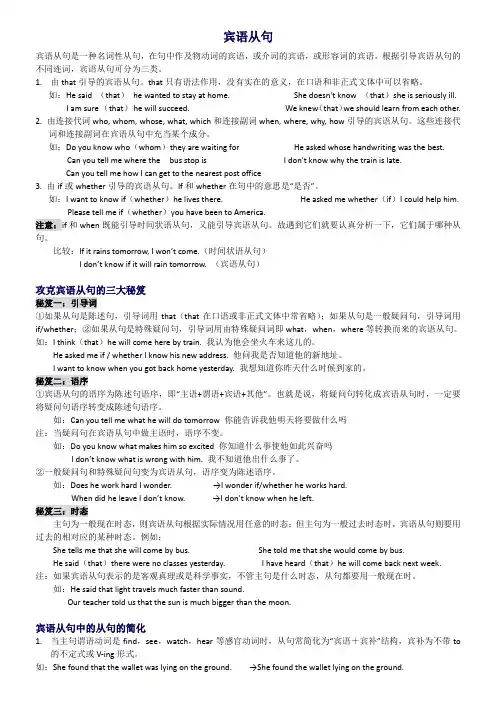
宾语从句宾语从句是一种名词性从句,在句中作及物动词的宾语,或介词的宾语,或形容词的宾语。
根据引导宾语从句的不同连词,宾语从句可分为三类。
1.由that引导的宾语从句。
that只有语法作用,没有实在的意义,在口语和非正式文体中可以省略。
如:He said (that)he wanted to stay at home. She doesn't know (that)she is seriously ill.I am sure (that)he will succeed. We knew(that)we should learn from each other.2. 由连接代词who, whom, whose, what, which和连接副词when, where, why, how引导的宾语从句。
这些连接代词和连接副词在宾语从句中充当某个成分。
如:Do you know who(whom)they are waiting for He asked whose handwriting was the best.Can you tell me where the bus stop is I don't know why the train is late.Can you tell me how I can get to the nearest post office3. 由if或whether引导的宾语从句。
If和whether在句中的意思是“是否”。
如:I want to know if(whether)he lives there. He asked me whether(if)I could help him.Please tell me if(whether)you have been to America.注意:if和when既能引导时间状语从句,又能引导宾语从句。
故遇到它们就要认真分析一下,它们属于哪种从句。
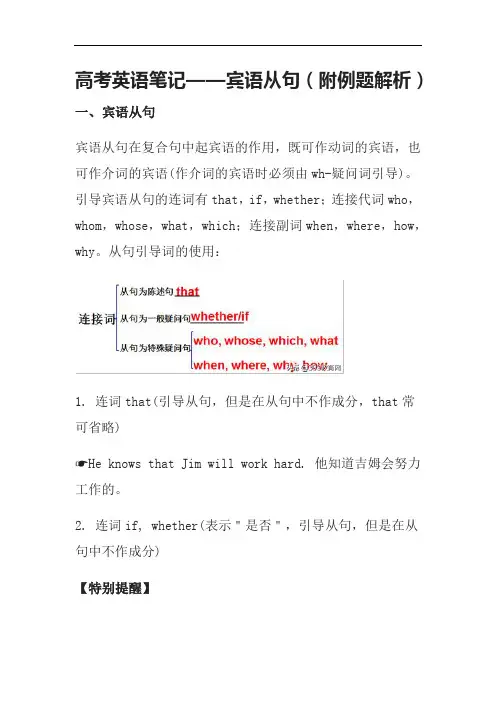
高考英语笔记——宾语从句(附例题解析)一、宾语从句宾语从句在复合句中起宾语的作用,既可作动词的宾语,也可作介词的宾语(作介词的宾语时必须由wh-疑问词引导)。
引导宾语从句的连词有that,if,whether;连接代词who,whom,whose,what,which;连接副词when,where,how,why。
从句引导词的使用:1. 连词that(引导从句,但是在从句中不作成分,that常可省略)☛He knows that Jim will work hard. 他知道吉姆会努力工作的。
2. 连词if, whether(表示"是否",引导从句,但是在从句中不作成分)【特别提醒】whether和if都有"是否"的意思,一般情况下两者可以换用,但在介词之后、不定式之前、与or not连用、在句首或在引导表语从句同位语从句时,只能用whether。
☛I want to know if/whether the news is true. 我想知道这个消息是不是真的。
☛He doesn’t know whether to stay or not. 他不知道改不该留下来。
【名师点睛】动词 doubt 用在疑问句或否定句中时,其后宾语从句常用that 作连接词;用在肯定句中时,连接词用 whether 或 if 皆可,而不用 that。
☛Do you doubt that he will win? 你怀疑他会赢吗?☛I don’t doubt that your proposition is wrong. 我不怀疑你的提议是错的。
☛He doubts whether/if I know it. 他怀疑我是否知道这件事。
3. 连接代词who, whom, which等☛Do you know who (whom) they are waiting for? 你知道他们在等谁吗?☛Do you know which dress fits her best? 你知道哪件连衣裙最适合她吗?4. 连接副词when, where, how, why☛Could you tell me how we can get to the station? 你能告诉我我们怎样才能去车站吗?学习宾语从句要把握三个要点:连接词、语序和时态。
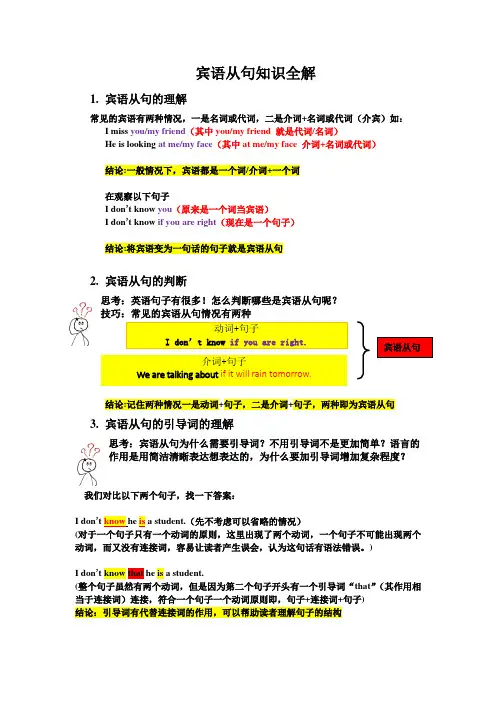
宾语从句知识全解1. 宾语从句的理解常见的宾语有两种情况,一是名词或代词,二是介词+名词或代词(介宾)如:I miss you/my friend (其中you/my friend 就是代词/名词)He is looking at me/my face (其中at me/my face 介词+名词或代词) 结论:一般情况下,宾语都是一个词/介词+一个词 在观察以下句子 I don ’t know you (原来是一个词当宾语)I don ’t know if you are right (现在是一个句子)结论:将宾语变为一句话的句子就是宾语从句2. 宾语从句的判断思考:英语句子有很多!怎么判断哪些是宾语从句呢?技巧:常见的宾语从句情况有两种结论:记住两种情况一是动词+句子,二是介词+句子,两种即为宾语从句3. 宾语从句的引导词的理解思考:宾语从句为什么需要引导词?不用引导词不是更加简单?语言的作用是用简洁清晰表达想表达的,为什么要加引导词增加复杂程度?我们对比以下两个句子,找一下答案:I don ’t know he is a student.(先不考虑可以省略的情况)(对于一个句子只有一个动词的原则,这里出现了两个动词,一个句子不可能出现两个动词,而又没有连接词,容易让读者产生误会,认为这句话有语法错误。
)I don ’t know that he is a student.(整个句子虽然有两个动词,但是因为第二个句子开头有一个引导词“that ”(其作用相当于连接词)连接,符合一个句子一个动词原则即,句子+连接词+句子)结论:引导词有代替连接词的作用,可以帮助读者理解句子的结构动词+句子I don ’t know if you are right. 介词+句子 We are talking about if it will rain tomorrow. 宾语从句1.判断以下句子哪个是宾语从句()A.Teacher told that the sun is bigger than the moon to us.B.I have hated him since I was five.C. The children go to school by car every day.D.I met the man who is my friend’s uncle yesterday at school.解析:根据一是动词+句子,二是介词+句子的两种情况,只有A选项符合以上的情况。
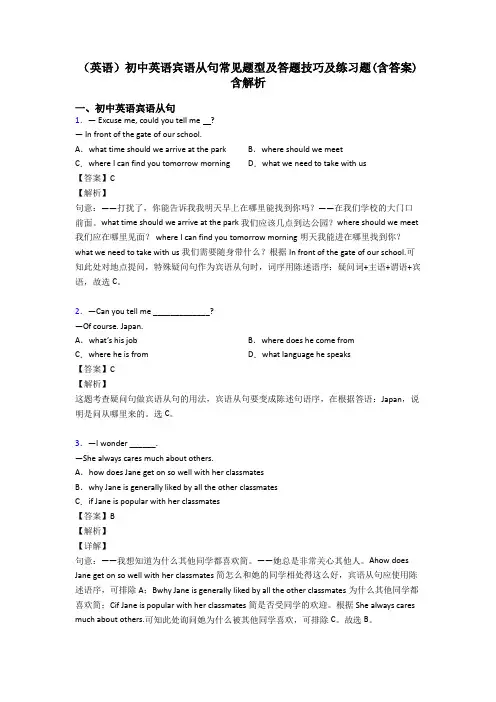
(英语)初中英语宾语从句常见题型及答题技巧及练习题(含答案)含解析一、初中英语宾语从句1.— Excuse me, could you tell me ?— In front of the gate of our school.A.what time should we arrive at the park B.where should we meetC.where I can find you tomorrow morning D.what we need to take with us【答案】C【解析】句意:——打扰了,你能告诉我我明天早上在哪里能找到你吗?——在我们学校的大门口前面。
what time should we arrive at the park 我们应该几点到达公园?where should we meet 我们应在哪里见面? where I can find you tomorrow morning明天我能进在哪里找到你?what we need to take with us我们需要随身带什么?根据In front of the gate of our school.可知此处对地点提问,特殊疑问句作为宾语从句时,词序用陈述语序:疑问词+主语+谓语+宾语,故选C。
2.—Can you tell me _____________?—Of course. Japan.A.what’s his job B.where does he come fromC.where he is from D.what language he speaks【答案】C【解析】这题考查疑问句做宾语从句的用法,宾语从句要变成陈述句语序,在根据答语:Japan,说明是问从哪里来的。
选C。
3.—I wonder ______.—She always cares much about others.A.how does Jane get on so well with her classmatesB.why Jane is generally liked by all the other classmatesC.if Jane is popular with her classmates【答案】B【解析】【详解】句意:——我想知道为什么其他同学都喜欢简。
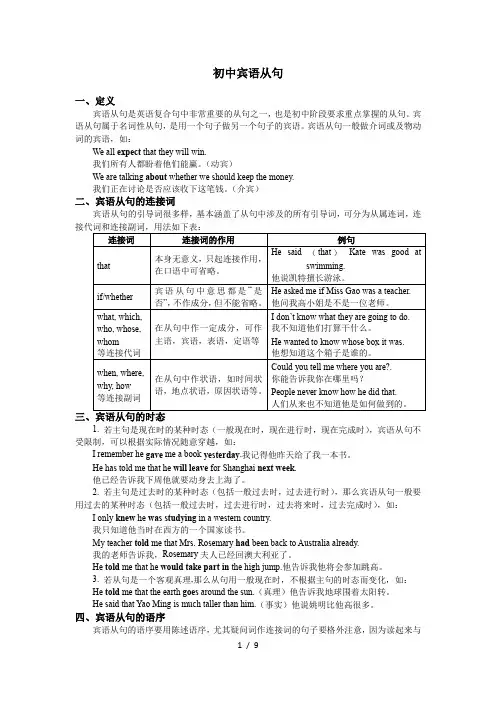
初中宾语从句一、定义宾语从句是英语复合句中非常重要的从句之一,也是初中阶段要求重点掌握的从句。
宾语从句属于名词性从句,是用一个句子做另一个句子的宾语。
宾语从句一般做介词或及物动词的宾语,如:We all expect that they will win.我们所有人都盼着他们能赢。
(动宾)We are talking about whether we should keep the money.我们正在讨论是否应该收下这笔钱。
(介宾)二、宾语从句的连接词宾语从句的引导词很多样,基本涵盖了从句中涉及的所有引导词,可分为从属连词,连1. 若主句是现在时的某种时态(一般现在时,现在进行时,现在完成时),宾语从句不受限制,可以根据实际情况随意穿越,如:I remember he gave me a book yesterday.我记得他昨天给了我一本书。
He has told me that he will leave for Shanghai next week.他已经告诉我下周他就要动身去上海了。
2. 若主句是过去时的某种时态(包括一般过去时,过去进行时),那么宾语从句一般要用过去的某种时态(包括一般过去时,过去进行时,过去将来时,过去完成时),如:I only knew he was studying in a western country.我只知道他当时在西方的一个国家读书。
My teacher told me that Mrs. Rosemary had been back to Australia already.我的老师告诉我,Rosemary夫人已经回澳大利亚了。
He told me that he would take part in the high jump.他告诉我他将会参加跳高。
3. 若从句是一个客观真理,那么从句用一般现在时,不根据主句的时态而变化,如:He told me that the earth goes around the sun.(真理)他告诉我地球围着太阳转。
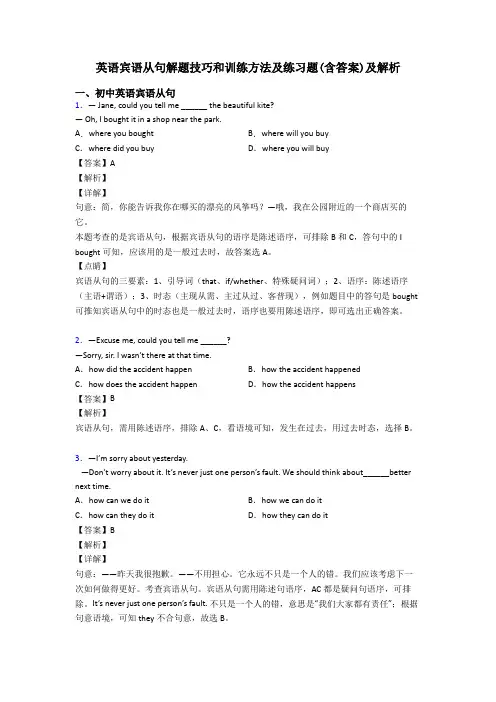
英语宾语从句解题技巧和训练方法及练习题(含答案)及解析一、初中英语宾语从句1.— Jane, could you tell me ______ the beautiful kite?— Oh, I bought it in a shop near the park.A.where you bought B.where will you buyC.where did you buy D.where you will buy【答案】A【解析】【详解】句意:简,你能告诉我你在哪买的漂亮的风筝吗?—哦,我在公园附近的一个商店买的它。
本题考查的是宾语从句,根据宾语从句的语序是陈述语序,可排除B和C,答句中的I bought可知,应该用的是一般过去时,故答案选A。
【点睛】宾语从句的三要素:1、引导词(that、if/whether、特殊疑问词);2、语序:陈述语序(主语+谓语);3、时态(主现从需、主过从过、客普现),例如题目中的答句是bought 可推知宾语从句中的时态也是一般过去时,语序也要用陈述语序,即可选出正确答案。
2.—Excuse me, could you tell me ______?—Sorry, sir. I wasn’t there at that time.A.how did the accident happen B.how the accident happenedC.how does the accident happen D.how the accident happens【答案】B【解析】宾语从句,需用陈述语序,排除A、C,看语境可知,发生在过去,用过去时态,选择B。
3.—I’m sorry about yesterday.—Don’t worry about it. It’s never just one person’s fault. We should think about______better next time.A.how can we do it B.how we can do itC.how can they do it D.how they can do it【答案】B【解析】【详解】句意:——昨天我很抱歉。
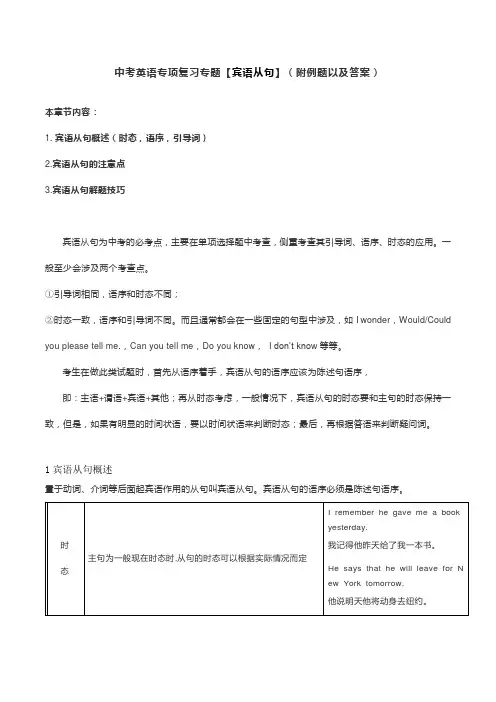
中考英语专项复习专题【宾语从句】(附例题以及答案)本章节内容:1. 宾语从句概述(时态,语序,引导词)2.宾语从句的注意点3.宾语从句解题技巧宾语从句为中考的必考点,主要在单项选择题中考查,侧重考查其引导词、语序、时态的应用。
一般至少会涉及两个考查点。
①引导词相同,语序和时态不同;②时态一致,语序和引导词不同。
而且通常都会在一些固定的句型中涉及,如I wonder,Would/Could you please tell me.,Can you tell me,Do you know,I don’t know等等。
考生在做此类试题时,首先从语序着手,宾语从句的语序应该为陈述句语序,即:主语+谓语+宾语+其他;再从时态考虑,一般情况下,宾语从句的时态要和主句的时态保持一致,但是,如果有明显的时间状语,要以时间状语来判断时态;最后,再根据答语来判断疑问词。
1宾语从句概述2注意点(1)否定转移当主句的主语为第一人称,谓语动词是think,believe,suppose等时,要将宾语从句的否定词转移到主句中,即主句的谓语动词用否定形式,而宾语从句的谓语动词用肯定形式。
I don’t think he will come with you.我认为他不会和你一起来。
(2)宾语从句的简化①当宾语从句的主语和主句的主语相同,且主句的谓语动词是hope,wish,decide,agree,choose等时,从句可简化为不定式结构。
I hope that I can receive your e-mail.=I hope to receive your e-mail.我希望能收到你的电子邮件。
②当宾语从句的主语和主句的主语相同,且主句的谓语动词是know,remember,forget,learn等时,从句可简化为“疑问词+不定式”结构。
She doesn’t know what she should do next.=She doesn’t know what to do next.她不知道下一步该做什么。
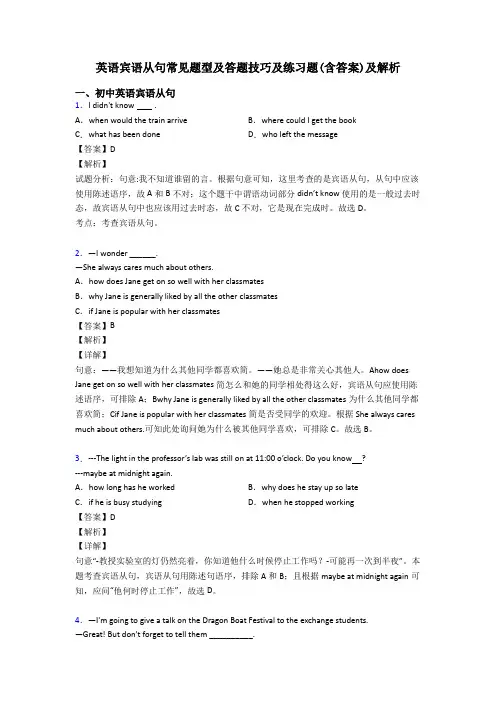
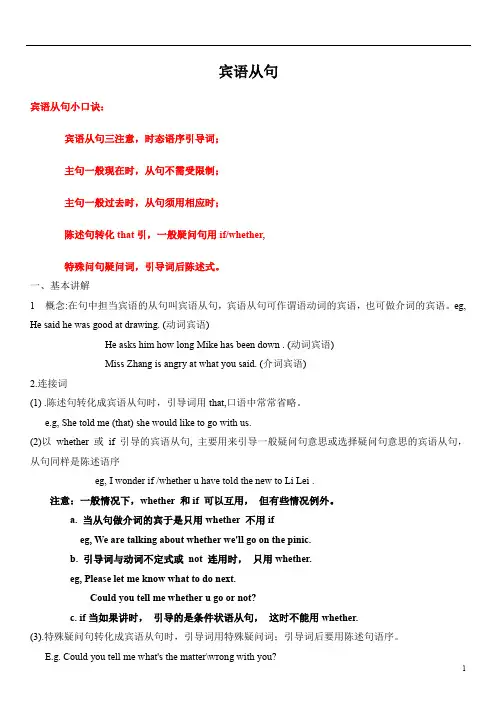
宾语从句宾语从句小口诀:宾语从句三注意,时态语序引导词;主句一般现在时,从句不需受限制;主句一般过去时,从句须用相应时;陈述句转化that引,一般疑问句用if/whether,特殊问句疑问词,引导词后陈述式。
一、基本讲解1概念:在句中担当宾语的从句叫宾语从句,宾语从句可作谓语动词的宾语,也可做介词的宾语。
eg, He said he was good at drawing. (动词宾语)He asks him how long Mike has been down . (动词宾语)Miss Zhang is angry at what you said. (介词宾语)2.连接词(1) .陈述句转化成宾语从句时,引导词用that,口语中常常省略。
e.g, She told me (that) she would like to go with us.(2)以whether 或if 引导的宾语从句, 主要用来引导一般疑问句意思或选择疑问句意思的宾语从句,从句同样是陈述语序eg, I wonder if /whether u have told the new to Li Lei .注意:一般情况下,whether 和if 可以互用,但有些情况例外。
a. 当从句做介词的宾于是只用whether 不用ifeg, We are talking about whether we'll go on the pinic.b. 引导词与动词不定式或not 连用时,只用whether.eg, Please let me know what to do next.Could you tell me whether u go or not?c. if当如果讲时,引导的是条件状语从句,这时不能用whether.(3).特殊疑问句转化成宾语从句时,引导词用特殊疑问词;引导词后要用陈述句语序。
E.g. Could you tell me what's the matter\wrong with you?特殊情况::当do you think后接特殊疑问句转化成宾语从句时,句式结构应为引导词+do you think+陈述句语序。
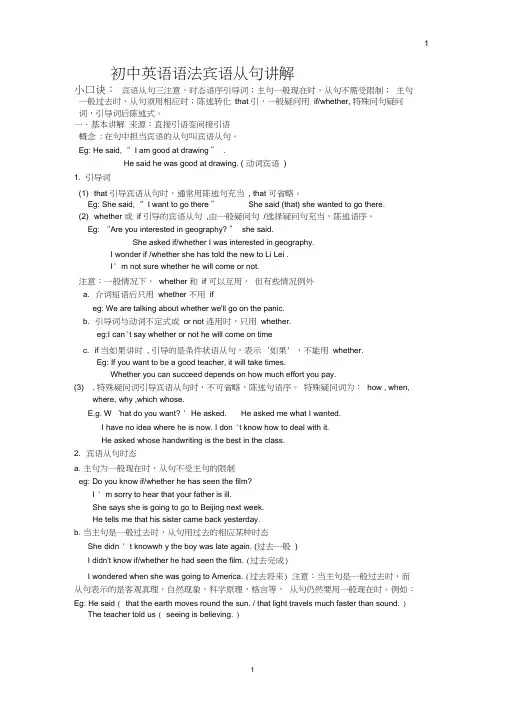
初中英语语法宾语从句讲解小口诀:宾语从句三注意,时态语序引导词;主句一般现在时,从句不需受限制;主句一般过去时,从句须用相应时;陈述转化that 引,一般疑问用if/whether, 特殊问句疑问词,引导词后陈述式。
一.基本讲解来源:直接引语变间接引语概念: 在句中担当宾语的从句叫宾语从句。
Eg: He said,“ I am good at drawing ” .He said he was good at drawing. ( 动词宾语)1. 引导词(1) that 引导宾语从句时,通常用陈述句充当, that 可省略。
Eg: She said,“ I want to go there ”She said (that) she wanted to go there.(2) whether 或if 引导的宾语从句,由一般疑问句/选择疑问句充当,陈述语序。
Eg: “Are you interested in geography? ” she said.She asked if/whether I was interested in geography.I wonder if /whether she has told the new to Li Lei .I' m not sure whether he will come or not.注意:一般情况下,whether 和if 可以互用,但有些情况例外a. 介词短语后只用whether 不用ifeg: We are talking about whether we'll go on the panic.b. 引导词与动词不定式或or not 连用时,只用whether.eg:I can't say whether or not he will come on timec. if 当如果讲时, 引导的是条件状语从句,表示‘如果' ,不能用whether.Eg: If you want to be a good teacher, it will take times.Whether you can succeed depends on how much effort you pay.(3) . 特殊疑问词引导宾语从句时,不可省略,陈述句语序。
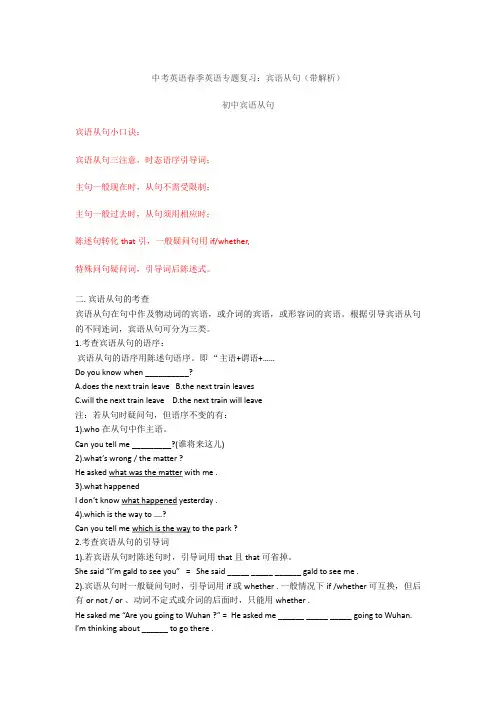
中考英语春季英语专题复习:宾语从句(带解析)初中宾语从句宾语从句小口诀:宾语从句三注意,时态语序引导词;主句一般现在时,从句不需受限制;主句一般过去时,从句须用相应时;陈述句转化that引,一般疑问句用if/whether,特殊问句疑问词,引导词后陈述式。
二. 宾语从句的考查宾语从句在句中作及物动词的宾语,或介词的宾语,或形容词的宾语。
根据引导宾语从句的不同连词,宾语从句可分为三类。
1.考查宾语从句的语序:宾语从句的语序用陈述句语序。
即“主语+谓语+……Do you know when __________?A.does the next train leaveB.the next train leavesC.will the next train leaveD.the next train will leave注:若从句时疑问句,但语序不变的有:1).who在从句中作主语。
Can you tell me _________?(谁将来这儿)2).what’s wrong / the matter ?He asked what was the matter with me .3).what happenedI don’t know what happened yesterday .4).which is the way to ….?Can you tell me which is the way to the park ?2.考查宾语从句的引导词1).若宾语从句时陈述句时,引导词用that 且that 可省掉。
She said “I’m gald to see you” = She said _____ _____ ______ gald to see me .2).宾语从句时一般疑问句时,引导词用if 或whether . 一般情况下if /whether 可互换,但后有or not / or 、动词不定式或介词的后面时,只能用whether .He saked me “Are you going to Wuhan ?” = He asked me ______ _____ _____ going to Wuhan. I’m thinking about ______ to go there .A.ifB.whetherC.that3).宾语从句时特殊疑问句时,引导词用特殊疑问词。
宾语从句一、宾语从句的语序问题(一)陈述句变宾语从句He was ill.Mike said that he was feeling ill.We must study hard.All of us know that we must study hard.(二)特殊疑问句变宾语从句1. 引导宾语从句的疑问代词有:who, which, what, whose, whom疑问副词有:when, where, how, why公式法:特殊疑问句+主语+谓语动词+其他Whose bike is this? Does anybody know?Does anybody know whose bike this is?2. 宾语从句的时态与主句的时态保持一致。
如:When the train will arrive? He asked me.He asked me when the train would arrive.3. 在语序上,要将疑问句语序改为陈述句语序。
如:Which one do you like best? She asked me.She asked me which one I liked best.注意: 疑问句中主语之前的助动词若是do / does / did , 变为宾语从句时,要先将其去掉,谓语时词再根据时态作相应的变化。
4. 特殊疑问句词在句中作主语,变为宾语从句时语序不变(时态应作相应变化)。
Who can answer the question? The teacher asked.The teacher asked who could answer the question.5. 特殊疑问句变为宾语从句后,用问号还是用句号完全取决于主句的句式:如主句为陈述句、祈使句,句末就用句号;如主句是疑问句,句末就用问号。
如:I don’t know when we shall start tomorrow.Do you know when we shall start tomorrow?(三)一般疑问句Does she live here?He asked me whether he lived here or not.Will the movie star come?I don’t know whether/if the movie star will come.Did he study English 20 years ago?My brother asked him whether he had studied English 20 years before.专项训练:语序I. 选择填空Please tell me _______________.A. how soon the work can finishB. how soon the work he can finishC. how soon can he finish the workD. how soon he can finish the work2. Do you know __________?A. when the sports meeting will beginB. when will the sports meeting beginC. when the sports meeting beginsD. when will begin the sports meeting3. The clerk at the post office asked Jack _________.A. how he wanted to post the parcelB. how did he want to post the parcelC. how does he want to post the parcelD. how he wants to post the parcel4. Can you tell me ___________?A. why did they give up halfwayB. why they give up halfwayC. why they gave up half wayD. why do they give up halfway5. Mr. Johnson asked Mary _____ with her.A. what is the matterB. what was the matterC. what the matter isD. what the matter was6. Mr. Smith didn’t tell me ________.A. when will Miss Black comeB. when would Miss Black comeC. when Miss Black would comeD. when Miss Black will come7. Susan didn’t believe ________.A. What Joe has told herB. What has Joe told herC. What had Joe told herD. What Joe had told her8. Could you tell me _______?A. When did he leaveB. Who has broken the vaseC. How many times has he visited thereD. Where you have gone9. Could you please tell me ________?A. Where is the maglev stationB. Which is the way to the maglev stationC. How can I get to the maglev stationD. How far is the maglev station10. Could you tell me ________?A. Where would the 2016 Olympics holdB. Where will the 2016 Olympics holdC. Where the 2016 Olympics will be heldD. Where the 2016 Olympics would be heldKey: D A A C B C D B B C二.宾语从句的时态1. 主句是现在的时态(一般现在时,现在进行时,现在完成时),从句可根据实际情况而定(可以是任何时态)The headmaster hopes everything goes well. (一般现在时)I’m sure that Tom is watching TV at home right now. (现在进行时)They have no idea at all where he has gone. (现在完成时)2. 主句是过去时态(一般过去时,过去进行时),从句的时态要变为相应的过去时态(一般过去时,过去进行时,过去完成时,过去将来时)She was sorry that she hadn’t finished her work on time. (过去完成时)The famous detective told me when he would leave Shanghai. (过去将来时)He wondered whether they were still living in Beijing. (过去进行时)He asked me whether I did my homework or not. (一般过去时)3. 当宾语从句表示的是一个客观真理或者事实时,即使主句是过去时,从句也用一般现在时态。
【英语】英语宾语从句及其解题技巧及练习题(含答案)及解析一、初中英语宾语从句1.一I wonder________________.- Believe it or not. He did it all on his own.A.how Jack finished such a difficult task in such a short timeB.when Jack finish such a difficult task in such a short timeC.why Jack finish such a difficult task in such a short time【答案】A【解析】【详解】句意:——我想知道杰克如何在这么短的时间内完成这么困难的任务。
——信不信由你。
这一切都是他自己做的。
how Jack finished such difficult task in such a short time杰克如何在这么短的时间内完成这么困难的任务。
when Jack finish such difficult task in such a short time 杰克是何时在这么短时间内完成这么困难的任务。
why Jack finish such difficult task in such a short time为什么杰克在这么短时间内完成这么困难的任务。
根据He did it all on his own.可知此处是表示他如何完成这个任务的,故选A。
2.—I wonder ______.—She always cares much about others.A.how does Jane get on so well with her classmatesB.why Jane is generally liked by all the other classmatesC.if Jane is popular with her classmates【答案】B【解析】【详解】句意:——我想知道为什么其他同学都喜欢简。
12字⼝诀解决宾语从句解决宾语从句12字⼝诀:是关键引导词,不同句词相异。
陈述句⼦⽤that;⼀般疑问是否(if,whether)替;特殊问句更好办,引导还⽤疑问词。
宾语从句⽤法(⼀)是关键引导词,不同句词相异。
陈述句⼦⽤that;⼀般疑问是否(if,whether)替;特殊问句更好办,引导还⽤疑问词。
(⼆)是时态常变化,主句不同从句异。
主句若为现在时,从句时态应看意;主句若为过去时,从句时态向前移。
(三)是语序要记清,从句永保陈述序。
宾语从句应注意三点1.引导词,陈述句⼀般由that引导,这时的that可以省略;⼀般疑问句则由if或whether引导;⽽特殊疑问句则由特殊疑问词引导。
2.时态,主句是现在时态,从句可⽤所需的任何事态;但如果主句是过去时态,从句要⽤过去的某种事态(⼀般前移⼀个时间段)客观真理仍⽤⼀般现在。
3.语序,宾语从句永远要⽤陈述语序。
宾语从句放在动词后⾯做宾语的句⼦,我们成为宾语从句。
宾语从句的分类1.当从句是陈述句时,从句⽤that引导,在⾮正式问体中可省略。
2.当从句是疑问句时,从句⽤whether/if引导,且从句为陈述句语序。
3.特殊疑问词引导的宾语从句,特殊疑问词有who,whom,whose,what,which,when,where,why,how等,且从句为陈述句语序。
宾语从句的时态1.主句中谓语动词是⼀般现在时,从句中谓语动词的时态不受限制,可根据具体情况判断时态;2.主句中谓语动词是⼀般过去时,从句中也必须要⽤某种过去时态,以保持时态的前后呼应。
3.注意宾语从句表⽰的是客观真理、科学原理、⾃然现象、名⾔时,则⽤⼀般现在时,不受主句时态的限制。
宾语从句的否定转移主句中,主语是I/We,谓语动词是think、suppose、guess,believe等,从句中的否定习惯上要转移到主句中,这就是否定转移。
语法巧记口诀:宾语从句
【速记口诀】
宾语从句须注意,几点事项应牢记。
一是关键引导词,不同句子词相异。
陈述句子用that;一般疑问是否(if,whether)替;特殊问句更好办,引导还用疑问词。
二是时态常变化,主句不同从句异。
主句若为现在时,从句时态应看意;主句若为过去时,从句时态向前移。
三是语序要记清,从句永保陈述序。
【妙语诠释】
宾语从句应注意三点:
①引导词,陈述句一般由that引导,这时的that可以省略;一般疑问句则由if或whether
引导;而特殊疑问句则由特殊疑问词引导。
②时态,主句是现在时态,从句可用所需要的任何时态;但如果主句是过去时态,从句时
态所表示时间一般往前移一个时间段。
③语序,宾语从句永远要用陈述句顺序。
中考英语春季英语专题复习:宾语从句(带解析)初中宾语从句宾语从句小口诀:宾语从句三注意,时态语序引导词;主句一般现在时,从句不需受限制;主句一般过去时,从句须用相应时;陈述句转化that引,一般疑问句用if/whether,特殊问句疑问词,引导词后陈述式。
二. 宾语从句的考查宾语从句在句中作及物动词的宾语,或介词的宾语,或形容词的宾语。
根据引导宾语从句的不同连词,宾语从句可分为三类。
1.考查宾语从句的语序:宾语从句的语序用陈述句语序。
即“主语+谓语+……Do you know when __________?A.does the next train leaveB.the next train leavesC.will the next train leaveD.the next train will leave注:若从句时疑问句,但语序不变的有:1).who在从句中作主语。
Can you tell me _________?(谁将来这儿)2).what’s wrong / the matter ?He asked what was the matter with me .3).what happenedI don’t know what happened yesterday .4).which is the way to ….?Can you tell me which is the way to the park ?2.考查宾语从句的引导词1).若宾语从句时陈述句时,引导词用that 且that 可省掉。
She said “I’m gald to see you” = She said _____ _____ ______ gald to see me .2).宾语从句时一般疑问句时,引导词用if 或whether . 一般情况下if /whether 可互换,但后有or not / or 、动词不定式或介词的后面时,只能用whether .He saked me “Are you going to Wuhan ?” = He asked me ______ _____ _____ going to Wuhan. I’m thinking about ______ to go there .A.ifB.whetherC.that3).宾语从句时特殊疑问句时,引导词用特殊疑问词。
宾语从句宾语从句是一种名词性从句,在句中作及物动词的宾语,或介词的宾语,或形容词的宾语。
根据引导宾语从句的不同连词,宾语从句可分为三类。
1.由that引导的宾语从句。
that只有语法作用,没有实在的意义,在口语和非正式文体中可以省略。
如:He said (that) he wanted to stay at home. She doesn't know (that)she is seriously ill.I am sure (that) he will succeed. We knew(that)we should learn from each other.2. 由连接代词who, whom, whose, what, which和连接副词when, where, why, how引导的宾语从句。
这些连接代词和连接副词在宾语从句中充当某个成分。
如:Do you know who(whom)they are waiting for He asked whose handwriting was the best.Can you tell me where the bus stop is I don't know why the train is late.Can you tell me how I can get to the nearest post office3. 由if或whether引导的宾语从句。
If和whether在句中的意思是“是否”。
如:I want to know if(whether)he lives there. He asked me whether(if)I could help him.Please tell me if(whether)you have been to America.注意:if和when既能引导时间状语从句,又能引导宾语从句。
故遇到它们就要认真分析一下,它们属于哪种从句。
比较:If it rains tomorrow, I won’t come.(时间状语从句)I don’t know if it will rain tomorrow. (宾语从句)攻克宾语从句的三大秘笈秘笈一:引导词①如果从句是陈述句,引导词用that(that在口语或非正式文体中常省略);如果从句是一般疑问句,引导词用if/whether;②如果从句是特殊疑问句,引导词用由特殊疑问词即what,when,where等转换而来的宾语从句。
如:I think(that)he will come here by train. 我认为他会坐火车来这儿的。
He asked me if / whether I know his new address. 他问我是否知道他的新地址。
I want to know when you got back home yesterday. 我想知道你昨天什么时候到家的。
秘笈二:语序①宾语从句的语序为陈述句语序,即“主语+谓语+宾语+其他”。
也就是说,将疑问句转化成宾语从句时,一定要将疑问句语序转变成陈述句语序。
如:Can you tell me what he will do tomorrow 你能告诉我他明天将要做什么吗注:当疑问句在宾语从句中做主语时,语序不变。
如:Do you know what makes him so excited 你知道什么事使他如此兴奋吗I don’t know what is wrong with him.我不知道他出什么事了。
②一般疑问句和特殊疑问句变为宾语从句,语序变为陈述语序。
如:Does he work hard I wonder. →I wonder if/whether he works hard.When did he leave I don’t know. →I don’t know when he left.秘笈三:时态主句为一般现在时态,则宾语从句根据实际情况用任意的时态;但主句为一般过去时态时,宾语从句则要用过去的相对应的某种时态。
例如:She tells me that she will come by bus. She told me that she would come by bus.He said(that)there were no classes yesterday. I have heard(that)he will come back next week.注:如果宾语从句表示的是客观真理或是科学事实,不管主句是什么时态,从句都要用一般现在时。
如:He said that light travels much faster than sound.Our teacher told us that the sun is much bigger than the moon.宾语从句中的从句的简化1.当主句谓语动词是find,see,watch,hear等感官动词时,从句常简化为“宾语+宾补”结构,宾补为不带to的不定式或V-ing形式。
如:She found that the wallet was lying on the ground. →She found the wallet lying on the ground.2.当主句谓语动词是hope,wish,decide,forget,plan,agree等,且主句主语与从句主语相同时,从句可简化为不定式结构。
如:She agreed that she could help me with my maths. →She agreed to help me with my maths.3.在连接代词/副词引导的宾语从句中,当从句主语与主句主语或间接宾语一致时,宾语从句可简化为“连接代词/副词+不定式”结构。
如:Can you tell me how I can get to the station →Can you tell me how to get to the station宾语从句中的人称变化和标点的使用1.从句的主语如果是第一人称,变为宾语从句则与主句的主语一致;如果是第二人称,则与主句的宾语一致;如果是第三人称,不用变化。
如:“May I use your knife” He asked me. →He asked me if he might use my knife.“Do you know her telephone number” He asked me.→He asked me if I know her telephone number.2.宾语从句的标点均由主句决定。
主句是陈述句,用句号;主句是疑问句,用问号。
如:Who will give us a talk I don’t know. →I don’t know who will give us a talk.Do you know Where does he live →Do you know where he lives口诀记忆宾语从句宾语从句三姊妹,that,if/whether,wh-/how展风采。
展风采有三关,引导词、语序、时态在把关。
主从时态须一致,陈述语序永不变。
陈述请你选that,疑问需用if/whether连。
特殊问句作宾从,原来问词不用换。
三关过后莫得意,注意人称和标点。
留意if/when变脸,从句简化记心间。
宾语从句专项练习()1. Do you know _______ during the coming summer holiday?A. what will Tom doB. what did Tom doC. what Tom willdo D. what Tom did()2. I want to know_________.A. what is his nameB. what’s his nameC. that his nameis D. what his name is()3. Do you know ________ I could pass the exam?A. thatB. whetherC. whatD. which()4. Jim doesn’t understand ____________.A. which is the way to the museumB. why his wife always goes shoppingC. what is the way to the museumD. why does she always go shopping ()5. ---Could you tell me ______ she is looking for?A. thatB. whoseC. whoD. which()6. Mr. King didn’t know _______ yesterday ev ening.A. when does his son come homeB. when his son comes homeC. when did his son come homeD. when his son came home()7. Could you tell me _______ the bike this morning?A. how does he mendB. how he mendsC. how he mendedD.how did he mend()8. ---I’m waiting for the mail. Do you know ________ it will arrive ---Usually it comes by 4: 00.A. howB. whereC. whenD. what()9. ---Excuse me, would you please tell me ________ ---Certainly.Go straight along here. It’s next to a hospital.A. how we can get to the post officeB. how can we get to the post officeC. how get to the post officeD. how could we get to the post office ()10. ---Can I help you ---Yes. I’d like a ticket to Mount Emei.Can you tell me ______ take to get there?A. how soon will itB. how soon it willC. how long itwill D. how long will it()11. He wanted to know ___________.A. whether he speaks at the meetingB. when the meeting would startC. what he’s going to do at the meetingD. where would the meetingbe held()12. ---Could you tell me _________ the Bamboo Garden ---The day after tomorrow, I think.A. when will you visitB. when you will visitC. whenwould you visit D. when you would visit()13. Would you please tell me _________ next, Mr. Wang?A. what should we doB. we should do whatC. what weshould do D. should we do what()14. You can’t imagine _________ when they received these n ice Christmas presents.A. how they were excitedB. how excited they wereC. how excitedwere they D. they were how excited()15. I want to know ________ you will come back at 8:00 tomorrow.A. thatB. whenC. whereD. whether()16. ---Could you tell me ____________ ---Sorry, I don’t know.I was not at the meeting.A. what does he say at the meetingB. what did he say at the meetingC. what he says at the meetingD. what he said at the meeting ()17. ---Could you tell me _________ last night ---Er, I was watching Euro 2004 at home.A. what you were doingB. what were you doingC. what you aredoing D. what are you doing()18. The teacher asked the students __________.A. if they were interested in dinosaursB. when was AlbertEinstein bornC. what they will do with the computersD. how many trees theyhave planted()19. Every morning the patients are asked if ________ their temperature taken.A. they had hadB. have they hadC. theyhave had D. had they had()20. It’s up to you to decide _______ you’ll go there, by air or by road.A. howB. whyC. thatD. when()21. Please tell me___ ___. I have some good news for him.A. where Robert livesB. where does Robert liveC. where Robert livedD. where did Robert live ()22. —We don’t know.—It is said that he was born in Canada.A.what he is B.when he was born C.where he comes from D.if he lives here()23. —May I come in I’m sorry I am late.—Come in, please. But could you please tell me ______A. why you are late againB. what were you doing thenC. who you talked withD. how do you came toschool()24. Could you tell me________A. When will Mary come backB. When Mary comes backC. When Mary will come back()25.—What did you say just now —I asked _______.A. that I could open the doorB. could I open the doorC. how could I open the doorD. how I could open the door ()26.—Do you know ________, Mike —On May 12th,2008A. when the earthquake took place in Wen ChuanB. when did the earthquake take place in Wen ChuanC. when the earthquake will take place in Wen Chuan参考答案:; ; ; ; ; ; ;; ; ; ; ;;;;; ; ;;; 21. A ; 22. C;23. A ;24. C ;25.D ;26. A。